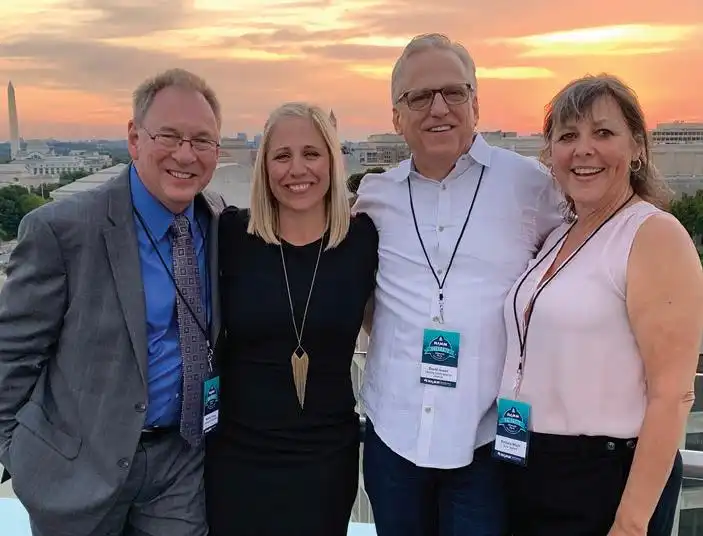
10 minute read
The Last of the Virtual Events?

NAMM ADVOCACY SUMMIT TAKES PLACE VIRTUALLY — FOR POSSIBLY THE FINAL TIME
Advertisement
BY BRIAN BERK
Editor’s note: Photos appearing in the story are from 2019, the most recent in-person NAMM Advocacy event.
In what NAMM hopes is the last virtual-only event of any kind it will host, the trade group on May 25 presented its NAMM Advocacy Summit, formerly called the NAMM Advocacy Fly-In, over Zoom. Traditionally, each year approximately 100 NAMM delegates travel to Washington, D.C., to speak to members of the U.S. House of Representatives and the Senate, as well as governors and their staffs. Although it is difficult to replicate the in-person experience on Capitol Hill, the four-hour virtual event, for which there were more than 700 registrants, provided plenty of good information and fun, and even included a cameo appearance from music education champion and former New York Yankee superstar Bernie Williams.


As is the case each year, NAMM presented its “asks” of politicians, or what the MI industry seeks to achieve through legislation. This year, a key “ask” is fully funding the Every Student Succeeds Act (ESSA), Title IV, Part A, to state and local school districts to expand access to well-rounded subjects, specifically including music and the arts. Fiscal year 2021 funding currently stands at $1.22 billion; however, the fully authorized funding amount of $1.65 billion is “necessary to ensure that the well-rounded goals of ESSA are realized for every child.”
Also, the “ask” requests support of ESSA’s “Title I funding for our nation’s most vulnerable children and Title II funding that promotes the effectiveness of our teachers”; NAMM further requests that the federal government “fulfill the intent of the law with authorized funding.”
Prior to making this “ask” however, NAMM suggested its advocacy members thank their politicians first. NAMM offered a template for what advocates could write to their politicians: “Thank you for your leadership through the pandemic and your ongoing commitment to address the challenges, needed changes and opportunities for our country. [We thank you] for the pandemic-related emergency assistance to states and local communities for education so that every child in our country receives the needed resources and support from schools and communities for their education and development needs.”
NAMM also suggested that advocates should share peer-reviewed research concerning mitigation protocols for in-person music learning as children return to school and sign or support the “Arts ARE Education” pledge, as well as share this support on their websites and via constituent outreach. The “Arts ARE Education” pledge asserts that the arts are “part of a balanced education, and asks signees to commit to supporting equitable access to arts education that includes instruction in all arts areas.”
The final NAMM Advocacy Summit “ask” is for politicians to authorize funding for the National Endowment for the Arts, which provides competitive grants in every state and congressional district for national arts and culture organizations.
NAMM also encouraged advocates to alert politicians if their local school







districts were named Best Communities for Music Education. A total of 686 school districts received this coveted distinction, with 80 receiving Support Music Awards. In fact, this topic sparked discussion in chat boards during the event, with attendees recalling politicians being so proud about having their districts named as one of the Best Communities for Music Education that they would brag to other members of Congress about it in places like elevators.
Most of all, NAMM emphasized that the local constituent voice carries the most weight with politicians, and that constituents should not be afraid to ask for what they want from their political representatives. According to Chris Cushing of law firm Nelson Mullins, your voice really matters. “To call this is a once-in-a-lifetime opportunity undersells it,” he said. “The amount of money out there is more than ever before. Funding is not a problem.”
Meeting with a politician’s staff is just as important, whether virtually or in person, Cushing added, but make sure to convey individual stories during meetings about the benefits of music, which can go a long way. Cushing further stressed that because we are in a unique historical moment, there is an opportunity for us to effect change. “Vladimir Lenin once said, ‘There are decades when nothing happens. Then, there are weeks when everything happens.’ This is one of those times,” he said.
When it comes to reaching out to governors specifically, Stephen E. Parker of the National Governors Association offered some fascinating information. “A large number of governors ‘get’ music education, but more must be done,” he said. Parker specifically mentioned Colorado Gov. Jared Polis and California Gov. Gavin Newsom as governors involved in music education. But more are getting involved. “Gaps in education is the biggest recent problem governors are facing,” said Parker. “Students have lost a year or more.”
When appealing to governors, Parker also recommended connecting your “ask” to job



creation (i.e., by emphasizing that increased funding for music education creates job opportunities for musicians and teachers). “Governors are graded on how many jobs they created and the revenues they bring in,” he said.
What Students Lost


Due to the COVID-19 pandemic, students lost a lot in terms of education, something which will be very hard to replace. However, more educational funding was needed even before the pandemic. Chris Duncombe and Claus Von Zastrow of the Education Commission of the States presented many data points regarding students. According to the Commission, in the 20172018 school year, 52 percent of U.S. students were eligible for free or reduced lunches and are in turn eligible for Title I funding. Also, 11 percent of students were homeschooled in March 2020, double the prior year, something that carries “short- and long-term implications,” the Commission stated.
One form of assistance to schools is the Elementary and Secondary School Emergency Relief Fund (ESSER), which is part of the Coronavirus Aid Relief and Economic Security (CARES) Act. Duncombe stressed that music education is eligible for this funding, and the funds are available in addition to any ESSA funding. “What better way to reengage than music education for in-person learning?” he asked.
Dr. Mackie Spradley, president of the National Association for Music Education (NAfMe), stated the pandemic made a huge change to music education. “Music educators had to find a new way of doing things,” she said. “The good news is, we could have a change in the paradigm of thinking. I hope we do not go back to normal. We need to fall forward and lean into the future.”
David Dik, national executive director of Young Audiences, stressed the importance of advocacy to counter learning loss during the pandemic as well. “There is a very narrow definition of learning loss,” he said. “It is something we need to think of. It is not about restoring what we had before, but to go back better. The precious commodity is not money; it is time.” Scott Lang of Be Part of the Music, which was recently acquired by Music & Arts, added that focusing on students is paramount. “Students are the currency,” he said. “Enrollment is the one panacea that cures all ills. Never apologize for getting kids enrolled in music.” The biggest thing lost during the pandemic has been ensemble music-making, added artist Eric Whitacre. “People ache to make music with other people in the room,” he said. “But now that music was taken away from us, there will be an explosive resurgence of musicmaking. We will see the world in song. It is essential that people are making music together.” “Students have missed the camaraderie function at a high level,” asserted Joe Lamond, president and CEO of NAMM. “They need it back. Kids suffer when not doing things collectively. Music and arts’ role in that is critical.” Other than collectively playing music, what do students need to have a successful career in music? “Students have told us beyond traditional things for music leadership, they need three things,” relayed Bill Pelto of the College Music Society. “Entrepreneurship training, community engagement and music advocacy.”




To get NAMM advocates inspired, NAMM dialed up speeches from several heavy hitters, including a keynote speech from Arne Duncan, former U.S. Secretary of Education and current managing partner of Emerson Collective. Duncan recalled growing up in a household where both his parents were devoted to music. He talked about growing up in a poor neighborhood and the inequities seen in America. “Talent is evenly distributed,” he said. “Opportunity is not.”
Duncan added that music education should be considered a core activity and no longer carry the stigma of being “extracurricular.” “The idea that music is extracurricular [makes no sense],” he said. “It has to be the norm [in schools], not the exception.”
Losing music and arts education for many students during the COVID-19 pandemic took a huge toll, Duncan noted. “We need to make opportunities available for every child,” he asserted. “That is what we have to fight for.”
Following these powerful words, the conversation shifted to whom Duncan admires most, as well as his leadership advice.
First on Duncan’s list for those he admires is former U.S. Secretary of Education Richard Reilly, whom himself has often appeared on Capitol Hill with NAMM members to help take up the fight for music education. “I really look up to him for his compassion and balance,” said Duncan. The former Secretary of Education next mentioned that he greatly admires Dr. Martin Luther King, Jr., as well as Barack Obama, with whom he remains friends. (Duncan acknowledged that he no longer plays basketball with Obama, because Duncan’s home is in Chicago, while Obama now lives in Washington D.C. However, Duncan does still play basketball in Chicago nearly every morning.)
Regarding being a great leader, Duncan said what is most important is what comes from the heart: passion. “My parents pursued their passion of music collectively for more than 40 years, and they made a difference,” he said. Duncan added that being a great leader requires building a top-notch team comprising the strongest, most diverse individuals. “I want people who tell me the truth, not what I want to hear,” relayed Duncan. “You might not want to hear it, but you need to hear it.” He continued, “Give your team the ability to make mistakes. I have told my team to do the right thing. And if they make mistakes, I told them I will take the blame. You are going to make mistakes. You are not going to bat 1.000.”
Duncan also made sure to praise music educators, who he said don’t just teach music, but touch souls. “The creativity, heart and compassion of teachers have been remarkable with a lot of fear and uncertainty at home during the pandemic,” he said.
Duncan concluded with these words: “Music educators, thanks for helping to change lives.”











